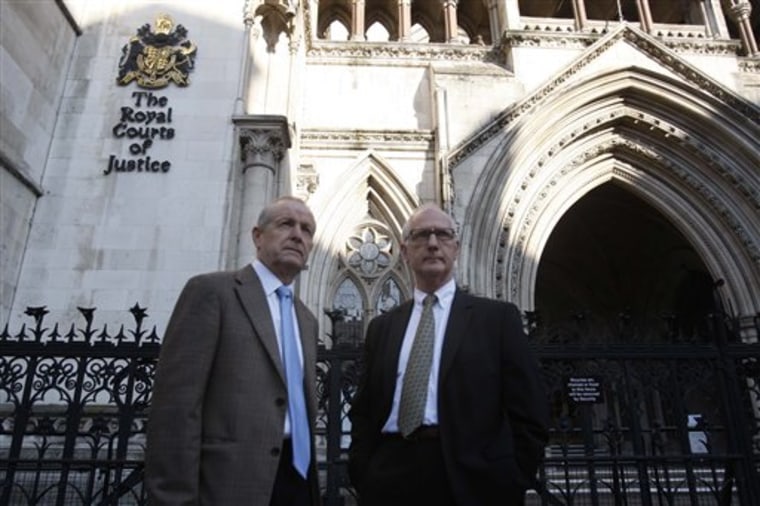Witnesses saw suicide bombers who attacked London's transport system on July 7, 2005 smiling and laughing as they traveled to the city to commit mass murder, a lawyer told a long-awaited investigation on Monday.
Attorney Hugo Keith told a coroner's inquest into the deaths of 52 commuters that travelers described the men as "smiling and laughing and generally relaxed," as they took a train with knapsacks packed with explosives.
The inquest was played audio recordings of the confusion that reigned just after the explosions, as London subway employees struggled to grasp the scale of what had happened.
Keith also revealed evidence suggesting the attacks may have been planned for an earlier date but postponed at the last minute.
The inquest at London's Royal Courts of Justice opened Monday — more than five years on from the bombings — with a minute's silence in memory of the victims of one of Britain's deadliest terrorist attacks.
Keith, chief counsel to the inquest, read out the names of all those who died when the four British Muslim bombers detonated devices aboard three subway trains and a double-decker bus, killing 52 and injuring more than 700.
He said the bombs struck down British nationals as well as foreigners "with no regard to whether the victim was Christian, Muslim, a follower of any of our other great faiths, an adherent to none."
"They were acts of merciless savagery which could only outline the sheer inhumanity of the perpetrators," Keith added.
The date of the attacks — "7/7" — has been seared into Britons' memories. But Keith said the bombings may have been planned for the day before.
He said a mobile phone recovered from one bomb site showed that ringleader Mohammed Siddique Khan sent a text message to another attacker at 4:35 a.m. on July 6, saying "Having major problem. Cannot make time. Will ring you when I get it sorted. Wait at home."
Keith said Khan visited a hospital with his wife on July 5 because of complications with her pregnancy. She had a miscarriage on the day of the attacks.
It was one of a string of startling new details revealed in Keith's opening statement.
He said a piece of paper recovered from the pocket of bomber Jermaine Lindsay mentioned journey times to Paddington, Westminster and Bond Street stations — some of the best known stops on the Underground system.
Paddington is a major railway station, Bond Street the city's ritziest shopping district and Westminster the stop for the Houses of Parliament.
It was not immediately clear whether mention of those stops meant they were targets of the attackers.
Three of the bombs exploded elsewhere on the subway system. The fourth bomber carried his device onto a bus, where it killed 13 people.
Keith said the bombers apparently prepared to fight police if intercepted, carrying improvised bombs, which could be thrown, and a semiautomatic handgun.
He also said a man resembling Lindsay approached an employee at King's Cross station and said he wanted to speak to the duty manager about something "very important." He disappeared before anyone could talk to him.
The hearings are expected to last five months and will look at whether the emergency services' response was adequate and whether the intelligence services and police could have prevented the attacks.
The inquest heard recordings of phone calls among transit staff and emergency workers on July 7. Keith said they show "a very confused picture," from early reports of a power failure to the realization of the scale of the disaster. Callers are heard describing injured, soot-covered passengers and asking for emergency services to be sent.
"A considerable amount of time had elapsed, you will have seen, from the moment of the explosion of the bombs to the acceptance by the staff ... that in fact they were bomb-related," Keith said.
A 2006 report into the bombings by the London Assembly said poor communications among emergency workers marred the response to the attacks. Mobile phone networks jammed and radio communication from ground level to rescue workers failed.
Although officials initially said they had no advance knowledge of the bombers, inquiries revealed that two of them, Khan and Shehzad Tanweer, had been under surveillance as part of an investigation into an earlier, foiled, bomb plot.
They were never pursued because officials were overwhelmed with other threats perceived to be more serious.
Ros Morley, whose husband Colin died in the bombing of a subway train near Edgware Road station, said she hoped the inquest would reveal whether mistakes had been made.
"Innocent citizens in the U.K. and worldwide need to know that they are protected now and in the future," she said. "I hope it is possible to gain something positive out of a deeply tragic event in which 52 innocent people lost their lives."
Some victims' relatives have expressed concern that the intelligence services will cite security issues to avoid giving evidence in public.
The coroner, senior judge Heather Hallett, said she would "balance carefully the needs of national security with relevance and fairness."
"It is in the interests of everyone that these inquests are conducted in as open a manner as possible," she said.
She said she had yet to decide whether to hear some evidence in private.
The inquest was delayed pending the prosecution of three people accused of helping the attackers choose their targets. They were found innocent last year, clearing the way for these proceedings to begin.
British inquests are fact-finding inquiries that take place when a person dies violently or under unusual circumstances. They can't establish civil or criminal liability, but in this case the investigation will give families of victims the chance to ask officials if more could have been done to prevent the attacks.
